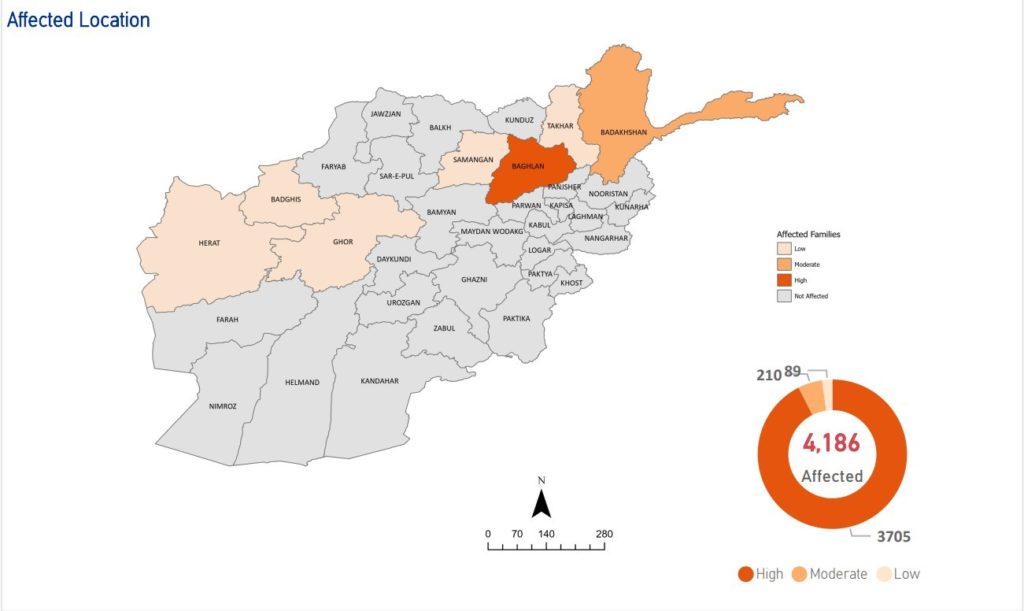Highlight 28/2024 – The role of governance underlined during climate crisis: Challenges unfolding in Afghanistan
Drorima Chatterjee, 31 July 2024

Climate change does not affect the world selectively but with the passing of every minute, it takes a more heinous turn. Its consequences are, however, felt at different levels in different places. Asia Pacific happens to be the world’s most disaster-prone region, where more than 2 million people were killed between 1970-2020.
For this reason, the Climate Risk and Early Warning Systems (CREWS) Initiative was launched at UNFCCC COP21 in Paris, in 2015. It provides access to sustainable early warning systems to safeguard the population of those Least Developed Countries (LDCs) and Small Island Developing States (SIDS) that face significant threats against natural hazards. Such countries have high mortality risks, such as the case of Afghanistan. CREWS undertakes a people-centred approach, thus engaging communities and local organizations to find timely early warning solutions.
Afghanistan is highly impacted by frequent floods, landslides, earthquakes, storms, and droughts. For this reason, CREWS started working here to make the country more resilient and improve its hydro-met, early warning, and climate services. Unfortunately, this has been stagnant since August 2021 ever since the interim Taliban Administration came into power.
The World Meteorological Organization (WMO) tried reinstating contact with the Human Resources of Afghanistan Meteorological Authority (AMA). Under the CREWS Afghanistan project, 40 million people are covered by early warning systems or (local) preparedness through CREWS support. Very importantly, this included a flash flood guidance system covering Afghanistan as well as Pakistan.
However, according to the latest news, more than 150 people in Afghanistan were killed due to flash floods that took place on 11 May 2024 in the northern province of Baghlan. The head of Baghlan’s natural disaster management department mentioned, “Residents were unprepared for the sudden rush of water set off by the heavy downpour in recent days”.
This raises the question of how no warning or information was made available that could have prevented this death toll. Initiatives like CREWS can help the government understand better what the shortcomings in the early warning systems were. Good Governance is one of the potential factors that can hinder timely forecasts. A whole branch of study called the Forensics of Disasters exists because it is extremely challenging to know what the real cause is.
Upon looking up the country’s national Met Service page, no data is available. This further confirms an existing gap in information. A country already undergoing a deadly humanitarian crisis needs its leaders to have plans of action in place instead of providing temporary relief after the mishap has occurred. Because if we are to understand the meaning of Governance in the words of Francis Fukuyama, it indicates, “a government’s ability to make and enforce rules, and to deliver services, regardless of whether that government is democratic or not.” Climate and governance are thus closely linked to one another and need to be in sync to tackle the climate hazards of the country, especially in a country like Afghanistan.
It comes down to the Taliban regime leaders on how they tackle this challenge in the future. Nearly two million people live in locations that will be severely impacted by flooding, 17 million people live close to fault lines in high-risk seismic zones, and high drought stress is expected to remain in 2024, according to the 2024 Humanitarian Needs and Response Plan.
More light needs to be shed on the reality of Afghanistan, the urgency to work with international organizations such as WMO to cooperate with the National Met Services for sharing data and projecting warnings well in advance, eradicate the lack of training and implementation, and not let the progress achieved previously, through initiatives like CREWS, go in vain.
Drorima Chatterjee, Highlight 28/2024 – The role of governance underlined during climate crisis: Challenges unfolding in Afghanistan, 31 July 2024, available at www.meig.ch
The views expressed in the MEIG Highlights are personal to the authors and neither reflect the positions of the MEIG Programme nor those of the University of Geneva.
